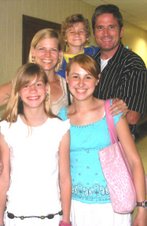
A young man in our church who is a first year seminarian at Covenant Theological Seminary surprised me at Christmas by giving me a book by one of his professors titled "Adopted by God."
Jeremy has always taken a great interest in our adoption drama, and it was especially touching that he wanted me to have a book emphasizing a Biblical teaching that hits so close to home, as all three of our children are adopted.
Some of this book was very hard to get through, as Peterson intersperses stories from adults who were betrayed by their earthly fathers. Barbara writes:
I remember the day my dad left. He knelt and hugged me and cried. The skimpy dress of a five year old girl could not protect me from the chill that gathered around my arms and legs. The scratchy, tickly whiskers - would I feel them no more? The arms that felt so safe - would they be gone forever?
As I read this I thought about our girls and the father who abandoned them, but also about the hurt and pain of my childhood, and it occured to me that this is something I suspect many adoptive parents can relate to. What kind of people are attracted to bring a hurting child into their homes? Undoubtedly, adoptive parents are people with big hearts, but I think in many cases, we are also people who had difficult childhoods. It is no coincidence that Dana and I both came from abusive, alcoholic families and it's no surprise that we've brought two teenage girls into our family who came from far worse situations than ours. From the absolute wreckage of our past, God has redeemed us and equipped us to enter into the lives of others who've experienced brokenness.
Our Father poured His grace and mercy out on us and made us His children. It took me a long time to apprehend this, but because I've been adopted too, I don't have to regret the past:
Reading this book has been difficult, but it's also been a great blessing as I learn more about what it means to be an adoptive father and an adopted son of God.
Thanks Jeremy!
Yes, we are His children, but there's a part of this that we would rather avoid, as Peterson warns:When the time had fully come, God sent his Son, born of a woman, born under law, to redeem those under the law, that we might receive the full
rights of sons." (Gal. 4:4-5)
This means that sharing in Christ's sufferings are a normal part ofthe Christian life. It comes with the territory. Belonging to Christ involves sharing in all that is his, including suffering now and glory later.I don't like to hear this. I'm ready for things to start getting easier, but I write this on a day when Dana and I are struggling with one of our children and faced with some big decisions. So when I read that we share in Christ's sufferings, I am actually encouraged. We have a worldwide family (much of which is being actively persecuted) called the church that carries our burdens with us, and most importantly, a brother who knows our struggles and intercedes to the Father on our behalf.
Reading this book has been difficult, but it's also been a great blessing as I learn more about what it means to be an adoptive father and an adopted son of God.
Thanks Jeremy!

4 comments:
In a similar vein, my life got better when I realized that it would never be easy. Almost nothing has ever come naturally for me. When I accepted that it was supposed to be that way, I didn't envy as much those who seemed to have everything.
I still envy 'em a little, though.
My thoughts are with you.
I'm reading the exact same book right now! Great minds think alike. ;) I saw it at the seminary bookstore and scooped it up after Christmas.
WOW! I was also abused and didn't have a good childhood. That makes me want to help hurting children even more. Thank you for this post. It looks like I need to get this book, too. :)
This sounds like something that would be interesting to explore in a doctoral dissertation or something! But, as the "mover and shaker" in our family's adoption adventure, my life has been nothing but blessed - by tremendously loving parents who exemplify integrity and a structured, peaceful, truly happy and protected childhood.
Post a Comment